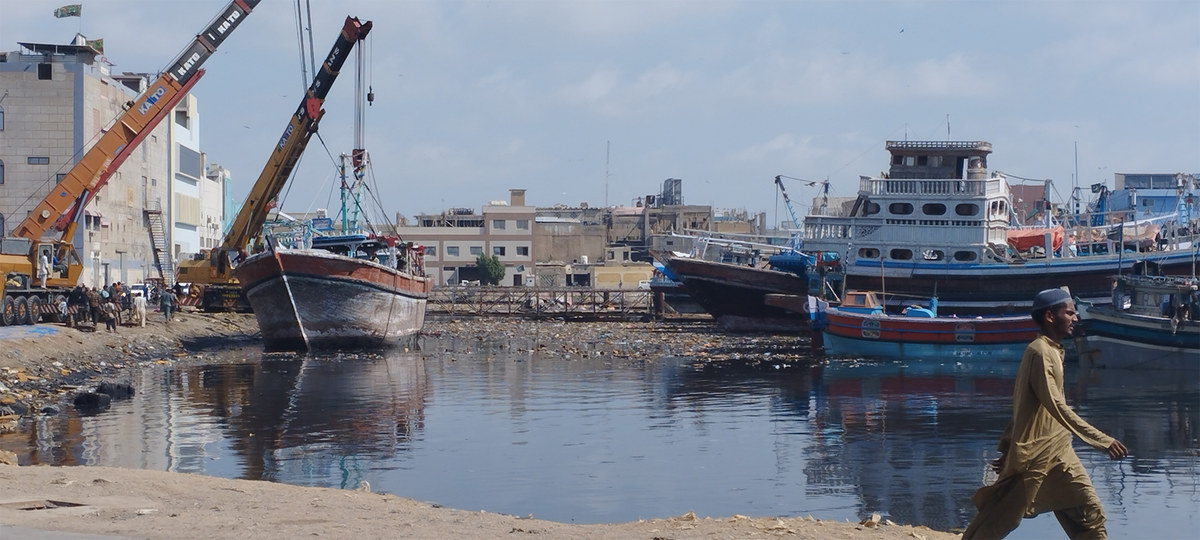KARACHI: The sound of tools clanging against metal echoed across the fish harbor in Karachi as Muhammad Aslam carefully cut through a large plank of wood with an electric saw.
This is the Karachi Boat Building Yard, the largest in the country but facing an almost 90 percent decline in business in the last five years that builders and contractors attribute to a diminishing demand for new cargo and fishing boats, a decline in the fisheries sector and a rising cost of raw materials.
Pakistan’s inflation rate rose to 31.4 percent year-on-year in September from 27.4 percent in August as the nation reels from high fuel and energy prices. Reforms required by a $3 billion IMF bailout, including an easing of import restrictions and a demand that subsidies be removed, have already fueled annual inflation, which rose to a record 38.0 percent in May. Interest rates have also risen to their highest at 22 percent, and the rupee hit all-time lows in August before recovering in September. Pakistan also raised petrol and diesel prices to a record high last month.
“It has become really challenging to make ends meet now,” a visibly shaken Aslam, 55, who earns a meager Rs2,000 ($7) per day, told Arab News.
“It wasn’t as difficult in the past as it is today because compared to the past, meeting expenses is much harder because of high inflation and low income.”
“The cost of imported wood, which was Rs4,000 [$14] per feet two years ago has increased to Rs15,000 [$52.50],” said Muhammad Moosa Loharwada, another boat builder who has been in the business for over 45 years.
“The cost of other inputs has also gone up.”

Muhammad Aslam is pictured working at at Karachi Boat Building Yard in Karachi, Pakistan on October 3, 2023. (AN photo by Khurshid Ahmed)
Two years ago, building a boat cost Rs10 million [$35,000], Loharwada said. Today it costs Rs40 million ($141,789). Builders made around 200-250 boats a year until the recent past, the builder added, but were now producing only 10-15 vessels a year.
A majority of the business now involved repairing old boats rather than making new ones, Loharwada added. Up to 10,000 workers worked at the yard in its heyday, while only 2,000-2,500 were employed there today.
The low demand for boats is another problem.
“Business is very slow,” boat contractor Muhammad Moosa, who goes by the name Babu, told Arab News. “The prices of diesel and petrol have fueled inflation and there is no demand for boats.”

A fishing boat is being lifted from the fish harbor channel at Karachi Boat Building Yard in Karachi, Pakistan, on October 3, 2023. (AN photo by Khurshid Ahmed)
He said in the past when one boat set sail, new orders would already be waiting for the builders to start work on.
“Now we have to wait for 2-3 months to get orders,” Babu lamented.
The boat building business also booms if there is more fish catch.
Pakistan’s fisheries sector growth declined from 1.57 percent in 2017-18 to 0.35 percent in 2021-22. It improved to 1.44 percent in the outgoing fiscal year, according to official data, but not enough to fuel a demand for new boats locally.
“We are looking for orders from abroad to keep the hearths of our skilled workers burning,” Hajji Ismail Qadri, the secretary of the Boat Builders Association, told Arab News, saying workers in the industry were “resilient” despite the challenges.
Aslam the builder said he hoped the government would come to the industry’s rescue.
“The government should strive to make the cost of living more affordable, so that we may find a way to endure and survive,” he said as he went back to sawing wood.

















